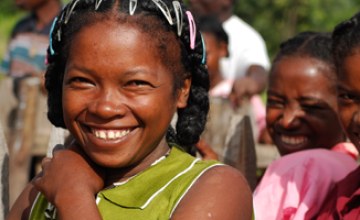The quest to establish genuinely equal opportunity for men and women - in both their contribution to and their benefits from Africa's economic transformation - took a further step forward today, when the Board of the African Development Bank Group approved its new Gender Strategy for the period 2014-2018.
"This represents a major milestone for the Bank, and it puts in place one of the critical foundations for realizing the 'Africa at 50' and 'post-2015' development agendas," said Geraldine Fraser-Moleketi, the Bank's newly appointed Special Envoy on Gender. "What is new in this Strategy is not just the recognition that gender equality is a human right, but that development will not happen unless women are fully included in the process. It will take our work to a new level."
The Gender Strategy is closely aligned with the Bank's overarching 2013-2022 Strategy, 'At the center of Africa's transformation', and its core objective of promoting inclusive growth which will broaden the opportunities for both women and men. Promoting gender equality sits alongside two other 'areas of special emphasis' in the Bank Strategy: supporting fragile states, and supporting agriculture and food security. The Gender Strategy itself therefore sets out how it will engage in these two areas.
It is built around three mutually reinforcing pillars which were identified as being key to addressing the underlying causes of gender inequalities in Africa. These are: strengthening women's legal and property rights; promoting women's economic empowerment; and enhancing knowledge management and capacity building on gender equality.
To date, the Bank has been mainstreaming gender equality work in its five operational priorities: infrastructure development, regional integration, private sector development, governance and accountability, and skills and technology. In July 2013, it received a US Treasury Development Impact Honors Award for a project focused on restoring social services and reducing gender-based violence in post-conflict Côte d'Ivoire. Going forward under the new Strategy, the Bank commits itself to greater and better integration of gender equality in all its programmes. Much of this work will revolve around strengthening the capacity of African countries to put into practice their own commitments to gender equality.
The Strategy also stresses the Bank's need to lead by example, as it works to support its member countries in Africa to promote gender equality. It commits to transforming the Bank's own organisational culture regarding gender equality, in its staffing and in its working culture. It proposes the strengthening of the Bank's gender expertise in its field operations, and the appointment of 'champions' of the cause of gender equality, inside and outside the Bank.
In Ms. Fraser-Moleketi's words: "We must make gender the business of all staff at the Bank. We want to create a Bank that lives and breathes gender equality, and this Strategy gives us the vision - and the nuts and bolts - of how we will do it. And that work must and will be measurable, in line with Bank-wide processes of monitoring and evaluation."
"It is a stark fact that half of Africa's people bear considerably more than half of its problems", said Donald Kaberuka, President of the African Development Bank Group. "Real growth has to be for women as much as for men, for younger people as for older, for rural communities as much as urban. And we know that economic growth alone does not suffice to create gender equality: it requires political and practical will to drive the gender agenda forward."
Editor's note:
In 2012, 78% of the Bank's newly launched projects had at least one gender indicator - above its target of 70%. Two thirds of its new projects were highly rated for their gender components, with the agriculture, water and sanitation sectors scoring best. The Bank is clear that consultations with women can significantly improve project design. In one water and sanitation project in Zanzibar, Tanzania, organising women into committees to set local priorities has resulted in a more equitable distribution of the benefits.
The proportion of project completion reports with specific gender data rose to 69%, despite the lack of gender baselines and indicators in earlier projects. Since gender was included in the Bank's 'quality-at-entry' reviews, project design has included an increased focus on results for women. There has also been a significant increase in new Country Strategy Papers with gender indicators, from 44% in 2011 to 75% in 2013.



